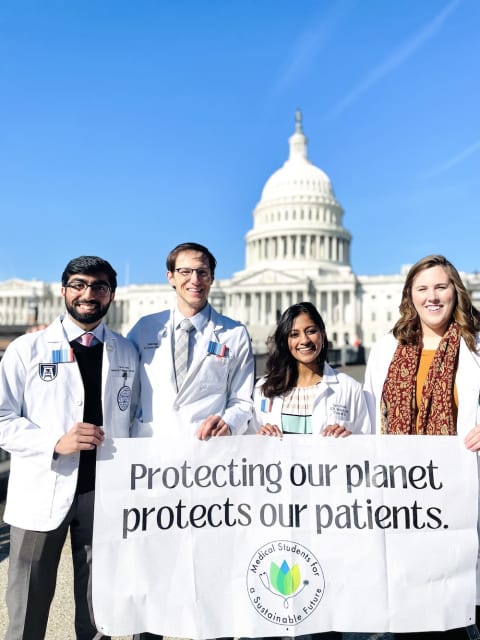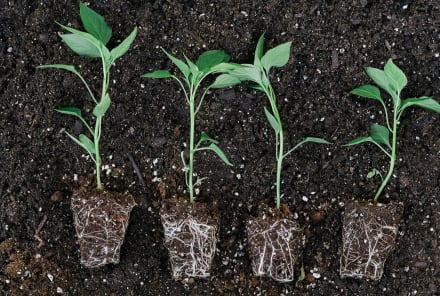Advertisement
The Next Generation Of Doctors Wants To Learn About Climate Change, Too


For Savita Potarazu, the disconnect was clear. After learning about the connections between climate change and human health in college, she was surprised to find them absent on her first-year medical school curriculum.
When she and her classmates searched their program's learning objectives for words related to the climate ("ecological," "environment," etc.), they found that only five, out of hundreds, appeared on coursework. "I did not feel like our curriculum represented the intersection of climate change and health, at least to the extent that I wanted it to," Potarazu tells mindbodygreen.
Now the executive chair of Medical Students for a Sustainable Future, Potarazu is part of a growing chorus of medical school students and faculty pushing for more climate education in healthcare—because climate-trained doctors mean a safer future for everyone.
The schools leading the way
Over the past several years (some trace the movement's roots to that terrifying 2018 IPCC report), universities across the country have started making curriculum changes in the name of the climate.
At Emory School of Medicine in Georgia, there's now a virtual elective called Climate Crisis and Clinical Medicine, where third and fourth year medical students can learn about how climate change will create new health challenges and exacerbate existing ones. When the four-week course's 17 lectures were posted online, more than 200 students from more than 30 institutions tuned in to join.
Over at the University of Colorado's Anschutz Medical Campus, a Climate & Health Science Policy Fellowship embeds a handful of students across disciplines—from family medicine to neurosurgery—into federal agencies and non-profits to become more fluent in environmental health policy and advocacy
Meanwhile, The University of California San Fransisco is building a Center for Climate, Health and Equity that will meld climate health education, research, and advocacy, while UC Berkeley-UCSF has a joint medical school and master’s program focused on the social determinants of health and health equity.
The number of schools prioritizing this curriculum is still relatively small, but Jay Lemery, MD, co-founder Colorado's climate health program, predicts that will soon change. "I expect this to expand rapidly in the next few years, because I think it's going to be imperative that medical schools see themselves as part of the solution," Lemery tells mindbodygreen.
Why do we need climate-informed healthcare?
If you don't think that climate change affects the way doctors work, think again. "Climate change impacts the top 10 diagnoses that we make in the ER every single day," Cecelia Sorenson, MD, the Director of the Global Consortium on Climate and Health Education at Columbia University, tells mindbodygreen.
Climate change impacts the top 10 diagnoses that we make in the ER every single day
Let's start with the more obvious reasons: Increasingly high temperatures can drive dehydration, heat stroke, cardiovascular disease, and heightened suicide risk1, especially in communities that lack cooling infrastructure. Plus, warmer climates are more hospitable to critters we don't want to have around (ticks, mosquitoes, etc.), increasing the rate of vector-borne diseases like malaria and Lyme2.
And as more pollutants make their way into the air, asthma is becoming more common3 and severe, while disasters like wildfires further threaten respiratory health and can harm air quality for thousands of miles. And of course, more extreme storms means more weather-related injuries.
Plenty of other facets of our health are sensitive to changes in climate, too. Our sleep quality takes a hit in hot weather. As pollen seasons get longer, our allergies get worse4. Our access to healthy nutrition suffers with less predictable weather. And that's not to mention the grief and anxiety that comes with the mounting climate crisis.
"This the risk multiplier for so many of the issues that we're dealing with," says Sorenson. "In developing countries, as well as in industrialized countries, [climate change] is the biggest health threat."
A student-run movement
When Sorenson was in medical school around a decade ago, none of her classmates were talking about these crossovers. Nowadays, students are the ones leading the conversation. "This next generation of physicians is really in tune with this," she's noticed. "They totally get it."
When Teddie M. Potter, PhD, RN introduced a course on the human health consequences of climate change at the University of Minnesota in 2017, it was at the urging of her students. Once she asked them if they wanted to introduce climate into the curriculum, the answer was an overwhelming yes.
"I was able to take that information to the deans of the Health Sciences and build the case that we were not serving our students. And that's what started to light the fire," Potter says. "We used the student voice to drive change." Her Global Climate Challenge: Creating an Empowered Movement for Change course slides are now open access and have been used to train not only physicians but nurses, pharmacists, dentists, public health specialists, and those in veterinary medicine.

This mimics Potarazu's experience at George Washington. When she became frustrated that the medical program didn't offer adequate climate training, it didn't take her long to find other classmates who felt the same and wanted to do something about it. Together, they took the time to map out how to infuse climate topics into existing course objectives and presented their detailed report to school administrators. Thanks to their initiative, climate issues are now a core theme in GW's medical school curriculum across all four years and will start to appear on lesson plans this fall.
Another student-led movement with a wide reach is the Planetary Health Report Card. This online database calls on students across the country to grade their universities on factors like their climate health curriculums and research opportunities. The report card's results are posted online for all to see and scrutinize (where else can you see Harvard get a B?). Potter sees it as a smart catalyst for institutional change because, as she puts it, "Nothing gets an academic moving faster than a failing grade."
Challenges and roadblocks
Looking at the report card, you'll spot the occasional A (Emory School of Medicine; Minnesota School of Nursing) and A- (Keele University School of Medicine in England; University of California Berkeley). But C's and D's are more common. Clearly, we still have a ways to go before every health professional receives climate training.
One challenge to a wider rollout is that curriculums are already packed tight to prepare students for licensing exams. "Oftentimes, I hear people say the curriculum is so full, we can't possibly teach one more thing," Potter explains. But she notes that this is a weak argument, especially when you consider how quickly programs were able to pivot once COVID hit. "If there's a will, there's a way," she says.
Most medical schools update their curriculum every few years as it is, and since climate impacts every facet of health, these themes can be pretty seamlessly integrated into existing lessons. It won't take a complete overhaul. "The point of our proposed intervention was not to add significant curriculum time but to apply a climate lens to what we already learn," Potarazu says, and she expects this is part of why her proposed plan was so well-received by faculty.
The bigger issue is finding people qualified to teach this information. "You're dealing with a generation of faculty who, for the most part, went through their own education prior to the urgency of climate change and other environmental issues. So they aren't necessarily prepared to teach about it," Potter says.
One way around this is to create lesson plans that can be shared open access, as they are at Emory and Minnesota. This plug-and-play model allows faculty to easily work this information into their existing lessons, personalizing it as they see fit. A school in California might want to focus more on preventing respiratory issues from wildfire smoke, for example, while one in Arizona would hone in on treating adverse reactions to extreme heat.
Another approach is to train existing faculty members on climate topics as part of their continuing education. Sorenson kickstarted the 10-week Climate and Health Responder Course to help healthcare professionals around the world receive free expert-led training on these issues.
One day, hopefully in the not-so-distant future, these parallels might even appear on medical licensing exams5, future incentivizing faculty to prioritize them.
The thinking is that after this information is passed from faculty to students, it will then quickly get dispersed in communities. "If you have 100,000 medical students who are trained every year, then each one goes into a different community and is equipped to really be an advocate for environmental health in that community, we're going to start seeing change," Sorenson says.
Physicians as climate advocates
The need for climate-trained health professionals is two-fold. On one hand, they'll save patient lives in and increasingly inhospitable world. (By taking patients off diuretics that make them vulnerable to dehydration during heat waves, for example, or warning respiratory patients to stay inside on high pollution days.) But they can also act as de-facto leaders in the environmental movement.
As Potter notes, nurses have been the #1 most trusted health professionals for 21 years in a row according to Gallup polling. This makes them uniquely equipped to disperse climate information in a way that communities trust and understand. Doctors have also long been viewed as arbiters of science and reason, and their motions can start movements. Just consider how a Surgeon General warning in the 1960s transformed smoking from a societal norm to a deadly habit that's been on a a steep decline ever since6.
By informing patients about the true impacts that climate change will have—and is already having—on human health, physicians can push the needle on the action we so desperately need.
Physicians can push the needle on the action we so desperately need.
"We have a new professional responsibility to be climate activists in a lot of ways," Ashley McClure, M.D., the co-founder of the California health care coalition Climate Health Now, previously told mindbodygreen. "[We need to] talk about climate in every institution we're a part of and anchor the urgency to act on climate as a health imperative, as a health emergency."
In advocating for policies that protect our planet, Potarazu feels that she's also protecting her future patients. "When it comes to advocating for environmental protection at a policy level, there are what we call co-benefits—positive impacts on human health, and animal health, and ecosystem health, which is absolutely relevant to the care that we provide as physicians, as nurses, as other allied health professionals," she says.
Under the Hippocratic Oath, medical professionals agree to do no harm. Encouragingly, the next generations of doctors are also committing to doing more good.
6 Sources
- https://pubmed.ncbi.nlm.nih.gov/30007545/
- https://www.epa.gov/climate-indicators/climate-change-indicators-lyme-disease#ref4
- https://www.who.int/news-room/fact-sheets/detail/asthma
- https://www.frontiersin.org/articles/10.3389/falgy.2022.959594/full
- https://www.frontiersin.org/articles/10.3389/fpubh.2022.1092359/full
- https://www.heart.org/en/news/2018/08/29/smoking-in-america-why-more-americans-are-kicking-the-habit











